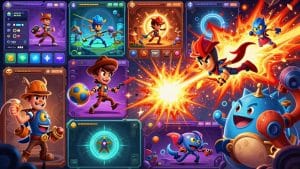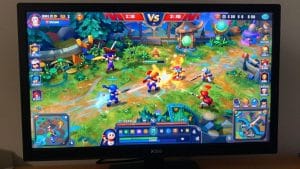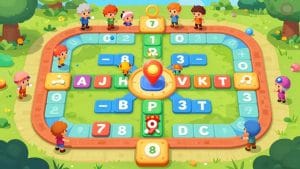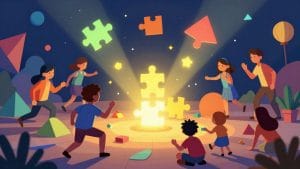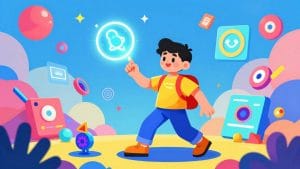So you want to try the Dungeons and Dragons RPG but have no idea where to begin? You’re not alone. At first glance, it can seem a bit overwhelming with all the books, dice, and rules. The good news is, starting out is actually pretty simple once you break it down. Whether you’re looking to be a player or step up as the Dungeon Master, this guide will walk you through what you need to know and what you actually need to buy (spoiler: it’s less than you think). Grab a pencil, round up some friends, and let’s get into how you can jump into your first Dungeons and Dragons RPG session.
Key Takeaways
- You don’t need a ton of stuff to start playing the Dungeons and Dragons RPG—just some dice, a character sheet, and the basic rules.
- The heart of the game is storytelling with friends, guided by a Dungeon Master who runs the adventure.
- Start with a pre-made adventure or a starter set if you’re new, so you don’t have to make everything up from scratch.
- Character creation is about picking a race, class, and background, then filling out a character sheet with your hero’s details.
- There are loads of resources and communities online and in local game shops to help you learn, find groups, and get inspired.
Understanding the Basics of the Dungeons and Dragons RPG

Getting into Dungeons & Dragons (D&D) can look complicated, but the game is designed for newcomers just as much as seasoned players. Let’s break down exactly what D&D is and the bedrock ideas you need to start your first game.
The Origins and Evolution of Dungeons & Dragons
Dungeons & Dragons started in 1974, thanks to Gary Gygax and Dave Arneson. The pair wanted to create a game that let players control individual heroes rather than whole armies. Over the decades, D&D has grown from three small booklets to shelves full of adventures, media appearances on popular shows like Stranger Things, and adaptations in many forms. Today’s fifth edition is the most user-friendly yet, inviting more people than ever to the table.
- First released in 1974.
- Evolved through several editions, with 5th Edition being the current and most accessible.
- Influenced countless games, books, and movies.
D&D’s growth has always centered on the idea of friends gathering to tell a shared story, whether in a living room or around a virtual table.
How Collaborative Storytelling Works
One of the things that sets D&D apart from board games is that everyone tells the story together. Instead of just following preset rules, players make decisions for their characters and, along with the Dungeon Master (DM), shape how the story unfolds.
You aren’t just playing a game—you’re creating an adventure with your group. Here’s what that means:
- The DM sets the scene, describes the world, and controls monsters and non-player characters.
- Players each take the role of a unique hero in the group, making choices and rolling dice to see what happens next.
- There isn’t really a winner or loser. The fun comes from seeing what happens based on the group’s choices.
Key Terminology Every Player Should Know
Before your first session, it helps to know some of the basic D&D vocabulary. Here are a few terms you’re almost guaranteed to hear:
| Term | Meaning |
|---|---|
| Dungeon Master | The main storyteller who runs the game and describes the world. |
| Player Character | The hero you control during the game. |
| Non-Player Character (NPC) | Any character controlled by the DM, like townsfolk or monsters. |
| Roll | Throwing dice to determine the outcome of an action. |
| Campaign | A series of connected adventures or sessions, usually with a main story. |
Some other common terms:
- Ability Score: A number that reflects a character’s natural talents.
- Hit Points (HP): How much damage your character can take before falling down.
- Level: A measure of your character’s experience and skills.
Getting comfortable with these basics will make your first session smoother and more fun for everyone. Every player starts by learning, and even the most experienced folks had a first game too.
Gathering the Essential Materials for Your First Dungeons and Dragons RPG Session

Before you start your first Dungeons and Dragons session, it’s smart to gather a few important materials. While the game is about imagination, having the right tools keeps things running smoothly and helps everyone have more fun. You can get into D&D with just pen, paper, and some dice, or go all-out with extra gear—it’s up to you and your group. Let’s go through what’s needed, what’s nice to have, and some tips for choosing the right items.
Core Rulebooks and Starter Sets
If you’re new, rulebooks and starter sets are the gateway. Here’s a quick rundown:
| Material | What It’s For | Typical Price | Notes |
|---|---|---|---|
| Basic Rules (PDF, Online) | Core game rules for players/DMs | Free | Downloadable from official D&D website |
| Player’s Handbook | Detailed player rules, character creation | $30-50 | Most groups share one copy |
| Dungeon Master’s Guide | Tools for running the game, adventures | $30-50 | Needed if you’re running games as DM |
| Monster Manual | Stats and details for monsters | $30-50 | Key for DM to run enemies and creatures |
| Starter Set or Essentials Kit | Streamlined intro with pre-made characters | $15-20 | Provides everything for first few sessions |
A starter set is often easiest for total beginners. The box usually includes rule summaries, premade characters, dice, and a quick adventure so you can play right out of the box.
Dice and Character Sheets
A standard D&D game uses a set of polyhedral dice. You’ll want:
- One set of seven polyhedral dice (D4, D6, D8, D10, D12, D20, and percentile die)
- Printed or digital character sheets
- Pencils and scrap paper for tracking notes, hit points, or inventory
Dice are cheap, with basic sets under $10. If you’re sharing dice, just make sure everyone takes turns rolling—they do get passed around a lot, especially the D20!
Many groups start out with one person bringing all the dice or a single printout of the character sheet. You’ll quickly see what works best for your group.
Optional Accessories and Tools
Once you’ve played a few sessions and want to add more features or make the game simpler to run, consider these extras:
- Miniatures and tokens for representing characters and monsters on a map
- Battlemaps or dry-erase grids to sketch out rooms and locations
- Notebooks for tracking story details, quests, and character backgrounds
- A carrying bag or case to store your books, dice, and sheets when traveling to games
- Digital tools and mobile apps for managing character sheets or rolling dice (DnDBeyond, Roll20, etc.)
These aren’t required, but they can make organizing the table easier and help your group visualize the action.
Most importantly, don’t stress over getting everything at once. Start with the basics, and add more as you learn what you enjoy about the game and what makes your sessions run smoother.
Creating Memorable Characters in the Dungeons and Dragons RPG
Making characters in Dungeons & Dragons is more than just filling in boxes on a sheet—it’s where storytelling begins for players. You’re not just picking numbers or names; you’re building someone who will face epic challenges, make tough calls, and maybe even surprise you as the game unfolds. Player characters are the beating heart of every D&D adventure.
Selecting a Race and Class
Your character’s race and class set the foundation for how they’ll interact with the world and what they can do. Your choice affects things like physical abilities, magical talents, and the role you might play within your group. Here’s a simple table outlining a few classic options:
| Race | Common Traits |
|---|---|
| Human | Versatile, adaptable |
| Elf | Keen senses, magical affinity |
| Dwarf | Resilient, skilled artisans |
| Halfling | Lucky, nimble |
| Half-Orc | Strong, intimidating |
| Class | Highlights |
|---|---|
| Fighter | Strong in battle, lots of weapons |
| Wizard | Casts spells, fragile in melee |
| Rogue | Sneaky, good at avoiding traps |
| Cleric | Heals and uses divine magic |
| Ranger | Skilled with bows, wilderness |
- Start by reading short summaries of each race and class.
- Imagine how each combination might behave—an elven fighter is different from a dwarf wizard in all sorts of ways (not just in combat).
- Don’t be afraid to ask your group or DM for advice if you’re stuck!
Developing a fun character can be just as enjoyable as playing the game itself. Try combining personality traits with your character’s backstory for added depth.
Filling Out a Character Sheet
Once you have a race and class, you’ll need to record the details on a character sheet. This is your base for all decisions in the game, tracking everything from skills to gear.
Typical steps:
- Write your name, race, class, level, and alignment.
- Roll dice or use a standard array for your basic ability scores (Strength, Dexterity, etc.).
- Calculate your modifiers—these numbers influence most rolls in-game.
- Choose any special abilities, proficiencies, or spells tied to race or class.
- Fill in starting equipment (this comes from your class section in the rules).
Keep your sheet handy every session. You’ll update it as your character grows and gathers experience or loot.
Developing Background and Motivation
A character isn’t just numbers—they have a story and a reason for adventuring. Backgrounds give you a few extra skills and help define your past. Motivation is why you go on dangerous quests instead of staying home.
- Pick a background like Soldier, Sage, or Criminal (each grants different advantages).
- Ask yourself questions: What drives my character? Do they have family, rivalries, or secrets?
- Think about quirks. Maybe your fighter is scared of water, or your wizard is obsessed with old legends.
Bringing your character to life with small details can help shape your play and make your entire campaign more memorable for everyone at the table.
Organizing a Group and Choosing a Dungeon Master
Starting a Dungeons & Dragons game means rallying a group that wants to tell a story together, and finding someone to guide the adventure. Your group is the heart of the game, and selecting the right Dungeon Master can shape your sessions. Every step, from inviting friends to joining online communities, matters when building a fun experience.
Recruiting Players for Your Game
Getting the right players for your table isn’t always easy, but it’s a big part of the fun. Here are a few ways to gather your party:
- Ask friends or family who might enjoy storytelling or games.
- Check out local game stores; many post flyers or host open game nights.
- Look into online groups on platforms like Discord, Facebook, or Reddit.
- Attend public events or conventions, where open games allow new people to join.
Some tables run best with four to five players, but that’s just a guideline. More or fewer can work, as long as everyone gets a chance to participate.
Many new players are nervous at first. That’s totally normal—just focus on having fun and listening to each other, and the game usually finds its rhythm.
The Role and Responsibilities of the Dungeon Master
The Dungeon Master (often called the DM) is the backbone of every D&D game. Their main tasks include:
- Preparing adventures and storylines for the group.
- Playing the part of all the monsters and non-player characters.
- Explaining and interpreting the rules fairly.
- Creating an environment that welcomes creativity and experimentation.
A good DM listens, adjusts, and keeps the game running smoothly. Don’t worry if you feel unsure as a new DM—many start off by running published adventures instead of inventing everything from scratch, and plenty of online resources can help you improve as you go.
| Dungeon Master Skills | Why They Matter |
|---|---|
| Good storyteller | Engages players and sets the mood |
| Fair rule interpreter | Keeps the game feeling balanced |
| Flexible and patient | Adapts when things go off-script |
| Prepared, but adaptable | Handles surprise choices by players |
Finding Public Games and Online Communities
If getting a group together at your kitchen table isn’t working, there are other options:
- Local game stores often host weekly or monthly D&D nights.
- Find-game boards online, such as on Roll20, Meetup, or Discord servers.
- Public library programs sometimes run beginner D&D sessions.
- Tabletop event apps and websites list games by city or topic.
You don’t have to know everyone at the table to have an exciting game. Many people join public sessions and walk away with new friends or a regular playgroup.
Every D&D group comes together a little differently, but communication and a sense of humor go a long way toward making every session something to look forward to.
Preparing and Running Your First Dungeons and Dragons Adventure
Starting your first Dungeons & Dragons (D&D) adventure can feel like a big job, but a bit of preparation brings everything together. A successful first session usually comes down to planning, patience, and some flexibility. Whether you’re running the game or playing, here’s how to make that debut session a fun experience for everyone.
Selecting an Introductory Adventure
Choosing the right adventure shapes the flow of your game. For new groups, a basic pre-written adventure is a safe bet. These are designed to guide both players and the Dungeon Master (DM) through a simple storyline with clear goals and straightforward challenges.
- Look for "one-shot" adventures. These can be finished in a single session, making them less overwhelming for beginners.
- Starter Sets like "Dragons of Stormwreck Isle" or "The Lost Mine of Phandelver" come ready with everything you need – pre-made characters, an adventure booklet, and a rule summary.
- Avoid sprawling campaigns at first; focus on a short story to learn the ropes.
A simple, self-contained story keeps everyone engaged and allows new players to focus on learning the basics without worrying about future sessions.
Game Setup and Session Logistics
Once you’ve picked an adventure, setting up is straightforward with a bit of organization. Get your table (physical or virtual) ready and make sure everyone has what they need.
- Gather supplies: Dice, pencils, character sheets, adventure notes, and snacks. If online, make sure everyone can access the platform you’re using.
- Decide on a play space: In-person games work well at a kitchen or coffee table. For online, platforms like Roll20 or Discord help fill the gaps.
- Set expectations: Let everyone know how long the session will last and review the group’s comfort levels with in-game themes.
- Review the rules: The DM should read through the pre-written adventure beforehand and make note of tricky spots or important story beats.
| Task | Who is Responsible | Tools Needed |
|---|---|---|
| Choose adventure | DM | Starter Set or PDF |
| Prepare character sheets | Players/DM | Printed sheets or D&D Beyond |
| Set up play space | DM/Host | Table, webcam, online tools |
| Run the game | DM | Adventure notes, dice |
Tips for New Dungeon Masters
Taking on the DM role can be intimidating, but sticking to a few guidelines can really smooth out the experience.
- Keep it simple. Focus on the main points of the story and don’t worry about memorizing every rule.
- Encourage creativity. If players want to try something unusual, see if you can work it into the story.
- Be flexible. Players may surprise you with their actions. Improvise and adapt; don’t be afraid to say, “Let’s figure out how that works.”
- Use pre-generated characters if time or confidence is short, saving the more detailed character creation for later sessions.
- Have a session recap at the end so everyone feels included and ready for the next round.
You don’t have to be perfect, and mistakes will happen—just keep the game moving and make sure everyone is having fun.
Exploring Additional Resources and Community Support for Dungeons and Dragons RPG
Dungeons & Dragons doesn’t have to be a solitary adventure. Finding the right resources and joining a welcoming community can make all the difference in your experience. There’s a vast, growing network of content and players available for beginners and longtime fans alike. Let’s look at what’s out there.
Podcasts, Shows, and Actual Play Streams
Actual play content is everywhere these days. Podcasts and streams record live D&D sessions, and they’re a great way to see how real games unfold. These shows can spark creativity, teach you how the rules work in practice, and entertain you at the same time. Here are some places to start:
- Critical Role: High-energy voice actors roleplaying incredible stories.
- The Adventure Zone: A comedic podcast that’s friendly to new players.
- Dimension 20: Big production and imaginative games with plenty of laughs.
Just keep in mind, many players on these shows are entertainers. Use them for inspiration, but don’t feel like your game needs to match their energy or style.
Watching or listening to others play lets you pick up tips for characters, roleplaying, and rules, all without needing to schedule a session or gather your own group right away.
Online Content and Fan Creations
Fan-made content is vast. Websites, digital forums, and blogs offer everything from free adventures to in-depth advice for players and Dungeon Masters. Useful resources include:
- Dungeon Masters Guild: Huge selection of digital adventures, rule options, and setting guides.
- D&D Beyond: Official digital rulebooks, character builders, and tutorials.
- Reddit (r/dnd, r/dndnext): Ask questions, share stories, or find homebrew content.
You’ll also find downloadable character sheets, campaign notes, and custom creations that can bring something special to your table.
| Resource Type | Where to Find It | Typical Content |
|---|---|---|
| Adventures/Modules | Dungeon Masters Guild | Ready-to-play adventures |
| Rules/Guides | D&D Beyond, Blogs | Tutorials, rule breakdowns |
| Discussion Forums | Reddit, Discord | Q&A, homebrew, player stories |
Local Stores and Organized Play Events
Sometimes, there’s nothing like rolling dice at an actual table. Local game stores are a hub for public games, events, and new player meetups. Organized play—like the D&D Adventurers League—runs weekly, letting you drop in and try out new characters in short, linked stories. Look for places hosting beginner nights or public campaigns:
- Hobby shops and game stores (often listed on the Wizards of the Coast website)
- Libraries or community centers (check event calendars)
- Bars or cafés occasionally run one-shot sessions for new groups
Some places supply all needed materials. Many groups welcome new players, no experience required. Just show up, join a table, and go on an adventure.
The D&D community is open and enthusiastic, no matter where you play—online or in person. Don’t be afraid to reach out; the hardest step is just saying hello.
Conclusion
Getting started with Dungeons & Dragons might seem a bit overwhelming at first, but it really comes down to a few basics: some dice, a character sheet, a pencil, and a group of people ready to play. The rules might look complicated, but you don’t have to know everything right away. Most players learn as they go, and there’s always someone willing to help out. Whether you’re joining a group at your local game store, playing online, or just gathering friends around a table, the most important thing is to have fun and let your imagination run wild. D&D is about telling stories together, making memories, and maybe rolling a few natural 20s along the way. So grab your gear, pick a character, and get ready for your first adventure. You’ll be surprised how quickly you get the hang of it—and how much you’ll look forward to the next session.
Frequently Asked Questions
What do I need to start playing Dungeons & Dragons?
To start playing D&D, you only need a set of dice, a character sheet, a pencil, and the basic rules. You can find the basic rules for free online. It also helps to have friends to play with and someone willing to be the Dungeon Master.
Do I have to buy all the books to play D&D?
No, you don’t have to buy all the books right away. The free basic rules are enough for beginners. If you want more options, the Player’s Handbook is a good first purchase. Starter sets also come with everything you need to begin.
What is a Dungeon Master?
A Dungeon Master, or DM, is the person who leads the game. They tell the story, control the monsters and characters the players meet, and help everyone follow the rules. The DM makes sure the adventure is fun and fair for everyone.
Can I play D&D online?
Yes, you can play D&D online with friends or strangers. There are websites and apps that let you roll dice, make characters, and even talk to other players. Some popular options are Roll20 and D&D Beyond.
How do I make my first character?
To make your first character, pick a race (like elf or human) and a class (like wizard or fighter). Fill out a character sheet with your character’s abilities, equipment, and a little backstory. The basic rules or a starter set will guide you step by step.
Where can I find other people to play D&D with?
You can find other players at local game stores, libraries, or online in forums and groups. Many places host beginner-friendly games, and there are lots of online communities where you can join a group or even watch games to learn more.




